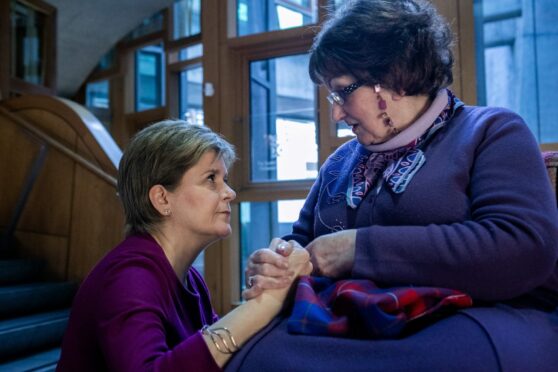
Clutching each other’s hands, the women cried together in the corridors of Holyrood. One was the first minister, the other was the mother who inspired her apology for Scotland’s forced adoption scandal.
As they wiped away their tears, Nicola Sturgeon laughed as Marion McMillan told her: “A wee lassie from Galloway and a wee lassie from Ayrshire have just changed the world.”
Sturgeon decided to use her last official statement as first minister to formally apologise for one of Scotland’s worst human rights scandals. “We are sorry,” she told MSPs.
She also used her speech to highlight the use of the cancer-causing drug Stilbestrol, also known as DES, that was given to millions of women until the early 1970s. Addressing MSPs on Wednesday, Sturgeon said the issuing of a formal apology by governments was an action reserved for “the worst injustices in our history”.
She added: “Without doubt the adoption practices that prevailed in this country for decades during the 20th Century fit that description.
“So today, as first minister, on behalf of the Scottish Government, I say directly to the mothers who had their babies taken away from them, to the sons and the daughters who were separated from their parents, to the fathers who were denied their rights, and to families who have lived with this legacy: for the decades of pain that you have suffered, I offer today a sincere, heartfelt and reserved apology.
“We are sorry. No words can ever make up for what has happened to you but I hope this apology will bring you some measure of solace.”
Moments after delivering the statement the first minister told The Sunday Post, which has campaigned for an apology for years: “Today was very special and the apology was long overdue. It means such a lot to me to have been able to do this.
“It was my last proper statement as Scotland’s first minister and I can’t think of an issue that was more important.”
McMillan, 74, who was just 17 and living in Stranraer when she became pregnant and sent to a mother and baby home, said she was “overwhelmed and grateful to the first minister for making my dying wish come true.”
The cancer patient said: “I finally feel that the mothers and children who were so cruelly taken and sentenced to a lifetime of shame and bereavement have been listened to at last.
“I felt Nicola Sturgeon meant every single word when she told parliament that we were victims of the worst injustices in history, and that nothing like this could ever happen again.
“Nicola said it was a very emotional day for her as her own mother was a very young teenage mum when she gave birth to her, and that in different circumstances what happened to us could have happened to her. She was deeply sincere.
“Her tears were genuine, as I told her that the apology was also for the many mothers and adoptees who had already died without ever hearing the words she said on behalf of Scotland: we are sorry.
“With the official apology, I believe we can now grow and heal and work to provide the correct support for all affected by forced adoption.
“I hope this landmark day will see the beginning of a raft of changes that will make it easier for families driven apart to find each other, and for the correct support to be made available to help them cope with the trauma of loss and the emotions brought to the fore through reunion which, in reality, is nothing like the television shows that bring parents and children together.
“Most of all, I feel the secrets and shame imposed upon all of us can finally be brought into the light so the truth can be told once and for all.”
Like many of the 60,000 unmarried Scottish mothers between the late 1950s and early ’70s, McMillan, who now lives in Paisley, was just a teenager when her family banished her to a mother and baby home where she was forced to give up her baby son.
McMillan said the regime at the Salvation Army-run home was “brutal and cruel” and she was banned from even comforting her baby during the nine months she fought to keep him.
She said: “I was called the Scotch lassie with the half-caste illegitimate son. I begged to keep my baby. I collapsed when my baby was taken at three months by prospective adoptive parents. They returned him a day later. They rejected him because they said he wasn’t perfect.
“He was nine months old when I was ordered out of the room to go and get the clothes I had knitted for him, days before his first Christmas. When I returned with his knitted booties, his crib was empty and I would not see him again for 40 years.”
McMillan returned home to Stranraer to be met by parents who told her they did not want her bringing shame on their family. She met husband George, now 73, weeks later and they went on to have three children together.
But the heartbroken mother never gave up hope of seeing her first-born, starting an organisation to help others. She travelled the world and for years campaigned for the apology which finally came last week.
In her statement to the Scottish Parliament, Sturgeon said: “The horror of what happened to those women is almost impossible to comprehend. It is the stuff of nightmares, yet those were not isolated cases – far from it.
“Consistently, mothers were lied to about the adoption process. When they did object, they were bullied or ignored. Some women were never even allowed to hold their babies.
“Most never got the chance to say a proper goodbye and many were threatened with terrible consequences if they ever tried to make contact with their child.
“For those mothers, it was a living nightmare – a nightmare from which they have never truly been able to wake.”
After Sturgeon’s apology, a series of MSPs praised The Post for its campaign.
Scottish Labour deputy leader Jackie Baillie hailed our “tenacious support” for victims while Conservative Scottish Shadow Social Justice Secretary Miles Briggs said our campaign was “a battle against the worst human rights injustice in our country’s modern history”.
SNP MSP Rona Mackay said we uncovered “heartbreaking injustice”. Conservative MSP Jeremy Balfour said: “The Post uncovered a dark moment in Scotland’s history.”
FM echoes concern over drug’s legacy
The Scottish Government’s landmark forced adoption apology also included an acknowledgment of concerns over cancer links to the drug Stilbestrol, which was given to women including those facing the forced adoption of their babies.
First Minister Nicola Sturgeon warned of the potential danger to the women who were given the controversial synthetic oestrogen hormone between the 1950s and ’70s.
Forced adoption mums were given the drug to dry up their breast milk so their babies could be taken from them. The drug, which has now been linked to rare cancers and birth defects, was given routinely to millions of women as a “pregnancy vitamin” to prevent miscarriage and bleeding during pregnancy. In her statement to parliament, Sturgeon said: “Up until the early 1970s, mothers in some cases were given Stilbestrol, a drug that dried up their breast milk and that is potentially carcinogenic.
“We will continue to explore with the people affected the key challenges that they face with regard to adoption records and the lasting health impacts that are faced by mothers who were given Stilbestrol.”
Shadow Scottish Social Justice Secretary Miles Briggs called for the chief medical officer to be involved in a concerted awareness campaign to alert all women given Stilbestrol, as well as their children and grandchildren who might be unaware they were exposed.
He said: “The potential danger of cancer means that we must take decisive action. There has already been decades of silence over this drug and that must end now.”
US campaigner and film-maker Caitlin McCarthy, who gave evidence last year to the Scottish Parliament, said: “Scotland just made history. Nicola Sturgeon’s apology was an incredible first step. But the world still has a long way to go regarding DES awareness, research and medical treatment.”
Forced adoptee: ‘The morning after the apology, I woke up and finally felt free to be myself, the real me’
Scotland’s oldest forced adoptee says the apology set her free from the burden of never being able to be her real self.
Marjorie White, 72, of Kaimes, Edinburgh, said: “I’ve spent my whole life never feeling I was truly loved or that I fitted in. But the morning after the apology I woke up feeling finally free to be the real me instead of the false identity imposed by my adopters. They removed my real identity the moment they collected me from the mother and baby home, changing my name to theirs but never truly accepting me as their own. They were cold, unfeeling and distant.”
When her adoptive father and his wife took her from The Tor, a Salvation Army mother and baby home in Edinburgh, they changed her name from Shirley Adam. She spent decades battling through red tape designed to keep the secrets of her “closed adoption”. “After my adopted father died, I found letters he had written saying that he couldn’t accept another man’s child,” said White. “It explained everything about why I always felt I was kept at arm’s length and never truly felt a part of a family where I looked and behaved so differently from them.”
White spent her adult life working as a nursery nurse, making sure the children she helped felt the love denied to her.
Her adoptive father was a schoolteacher.
“My adopted father demanded perfection in everything,” she said.
“If my handwriting wasn’t perfect, or my homework had even a small mistake I was made to redo it over and over until he was satisfied. It was a constant strain for me trying to live up to that unreachable perfection.
“I was clearly very different from them. I was tall, awkward. I was kept at arm’s length, so I never felt loved. For a child who craved love and acceptance, such casual indifference felt like cruelty.
“I was put on Librium and then Valium at age 15 to stop my questions over adoption because I kept asking who I was. They thought the pills would shut me up. Instead, they made me sleep so much, I remember having to wake up in the early hours of the morning to get my school homework done.
“My adoptive mother kept asking ‘why have we been given a mental one?’ That left terrible psychological scars which I battle to this very day.
“I never married. When I confided that I had been adopted, one man told me I should be grateful to him because even my own parents hadn’t wanted me. That destroyed any hope of me feeling I could fully trust anyone.”
White spent decades battling through red tape designed to keep the secrets of her ‘closed adoption.’ When she finally found her real mum, Margaret Adam, they had just four years together before Margaret died. White said: “The dreadful injustice of forced adoption kept us apart so we were unable to have more than a few short years together. We both felt cheated.
“My mum told me she had never wanted to give me up. She felt tormented by guilt and pain all her life as a result of being coerced and bullied. None of the mothers deserved that. It was cruel, inhuman. It took me years more to find my real father, Peter McAllister, who had been just 17 when I was born. He’d gone to Australia and hadn’t known for years that I’d been born.
“We only managed to speak with each other a couple of times on the phone but there was the same instant rapport between us I had found with my real mum. Heart problems killed him before we got to hold each other. The loss was overwhelming.”
A cruel twist of fate took him from her before White could travel to see him. “Heart problems killed him before we got to hold each other, she said. “The loss was overwhelming.”
White has been diagnosed with PTSD because of the trauma she suffered during her childhood. She said: “What was done to thousands of babies, mothers and fathers, was wrong.
“The First Minister needed to acknowledge the lifelong pain caused.
“I trained to become a counsellor, and would very like to bring that up to date and use my skills to help other adoptees and families through the trauma of reunion. I hope that will be the beginning of a new future.”
Monica Lennon: This apology is not the end but can be a new beginning
“We are sorry.”
Three small words but ones the survivors of forced adoption, all the mothers and all their children, longed to hear and not because an apology can undo what has been done. Nothing can do that.
It is right the terrible wrong inflicted simply because they were unmarried has, at last, been properly acknowledged by the state. It is right for the current generation of leaders to take moral responsibility for abuses of the past and Nicola Sturgeon’s words of regret will be formally recorded as the moment Scotland finally owned the cruelty that tore families apart and changed lives forever.
It was too long a secret, wrapped in misplaced silence, stigma and shame.
Campaigners have fought a long battle for justice and their stories will stay with me forever. When I led a debate at Holyrood in 2021 calling for a national apology, I read the words of Marion McMillan, who has been such a tireless campaigner.
The scandal is often described as “historic” but the legacy is in the here and now. For the adult adoptees fighting for access to medical and adoption records, there is much still to be done. Those who need it must now have access to specialist counselling and words need to be backed up with action and funding.
Reunion, for those who seek it, can be difficult. Families also want to see more support to help them with their journey.
The first minister was also right to raise the dangers of the drug given to new mothers now linked to cancers down the generations and urge women to attend breast and cervical screening appointments.
Increasing specialist services and improving access to records will hold the key to so many unanswered questions.
Thankfully, finally, Scotland has said sorry but that should not be the end but a beginning.
Post’s chief reporter hailed
The work of campaigning journalist Marion Scott was hailed by politicians and campaigners as the first minister apologised to the victims of forced adoption.
The Sunday Post’s chief reporter first revealed Marion McMillan’s plea for a formal acknowledgement of the human rights scandal in April 2015 before writing dozens of articles detailing its devastating impact.
The award-winning journalist’s reporting maintained a relentless focus on the calls for a formal apology throughout Nicola Sturgeon’s time in office before the first minister delivered it in her final week.
Later, Monica Lennon was among many MSPs to praise Scott, a former Journalist of the Year, saying: “This apology, so important to so many, would simply not have happened without Marion’s tireless and tenacious reporting.
“She has been there every step of this journey, raising the voice of mothers and adoptees and keeping hope alive.
“Seeing the two Marions sitting side by side in parliament to hear the apology was overwhelming. We can never thank them enough.”

Enjoy the convenience of having The Sunday Post delivered as a digital ePaper straight to your smartphone, tablet or computer.
Subscribe for only £5.49 a month and enjoy all the benefits of the printed paper as a digital replica.
Subscribe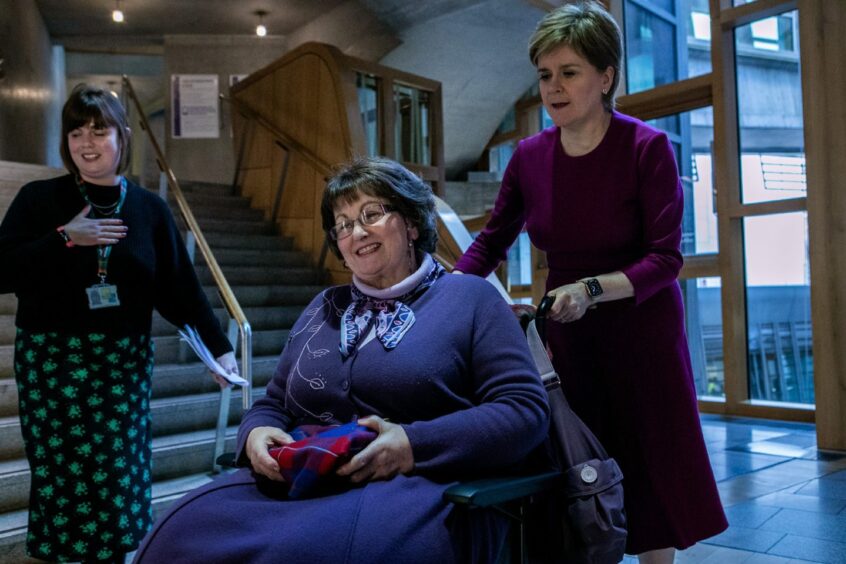 © Andrew Cawley
© Andrew Cawley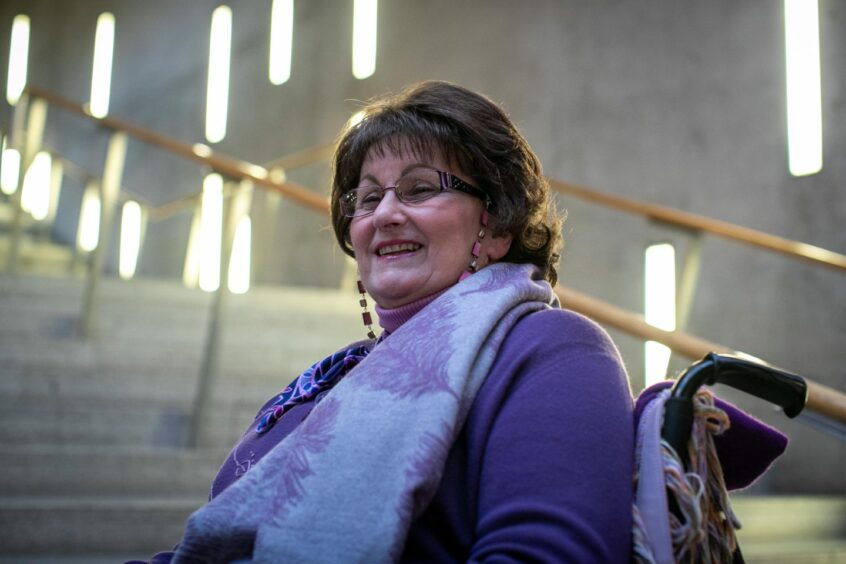 © Andrew Cawley
© Andrew Cawley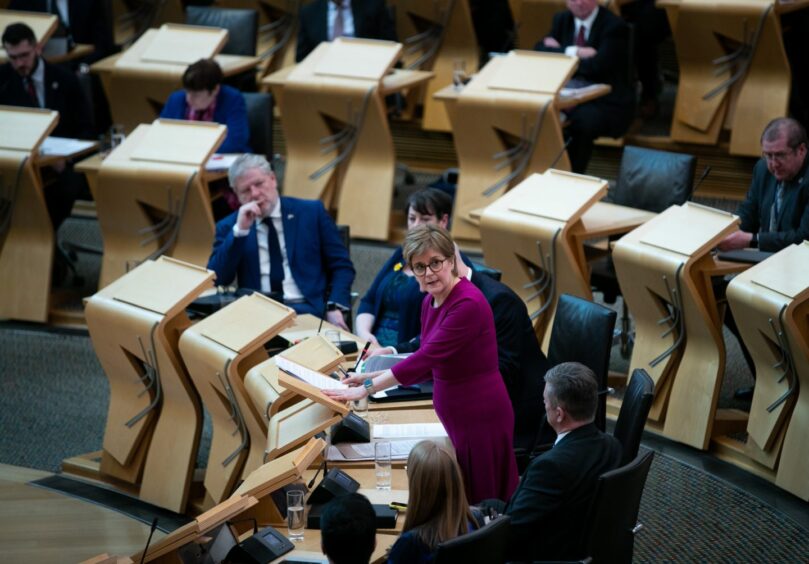 © Andrew Cawley
© Andrew Cawley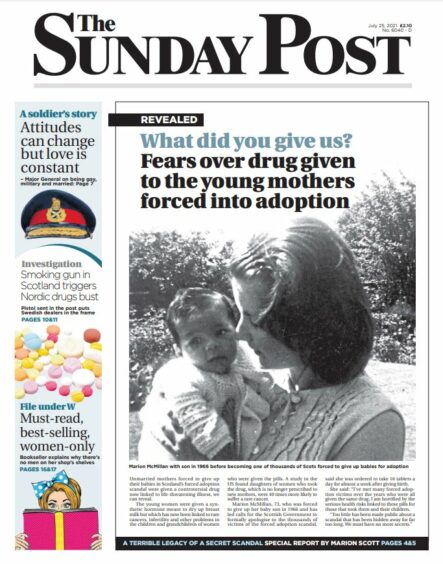
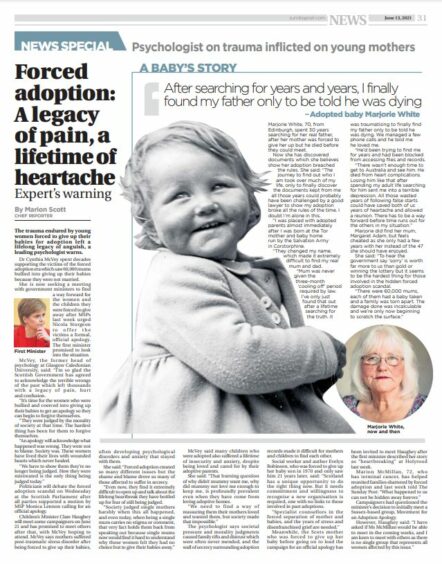
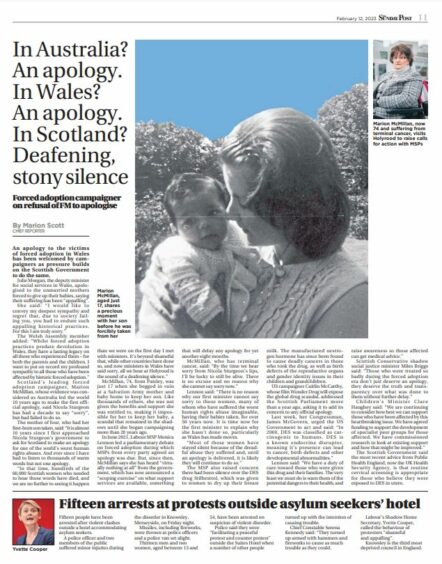
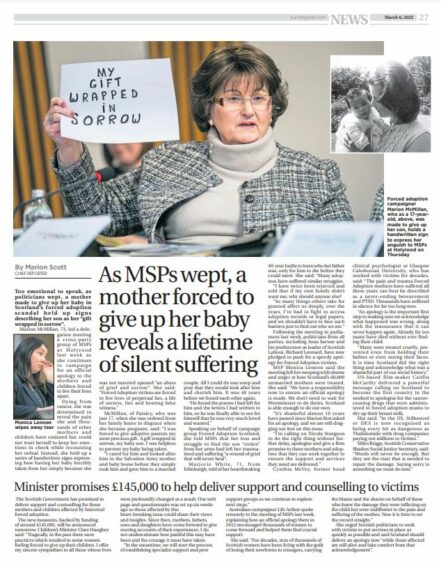
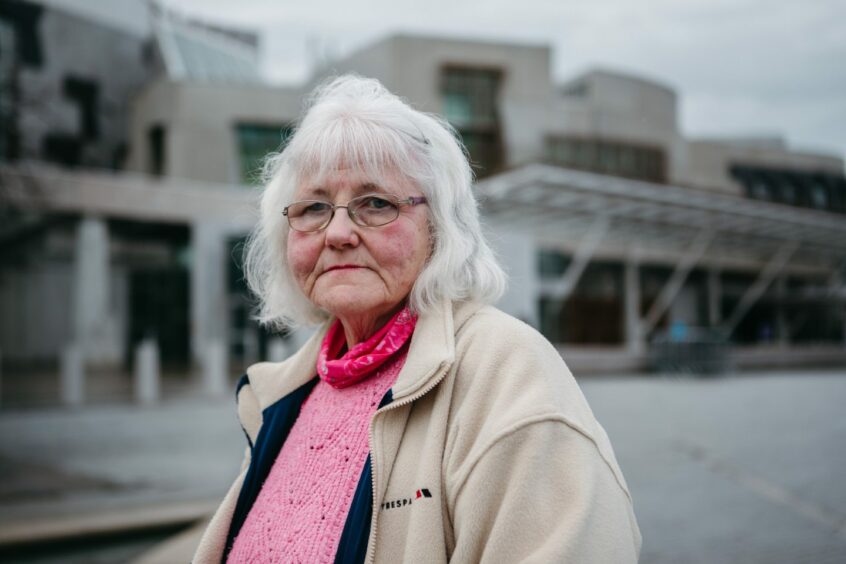 © Andrew Cawley
© Andrew Cawley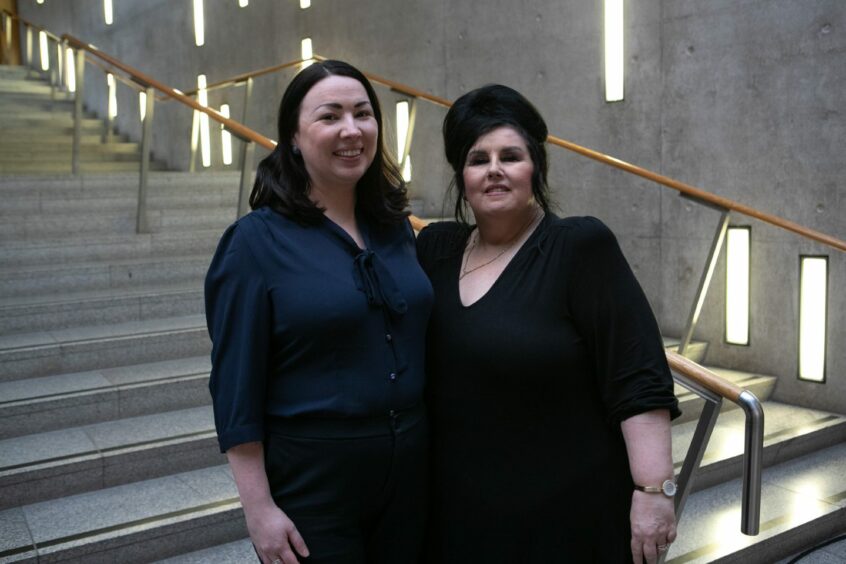 © Andrew Cawley
© Andrew Cawley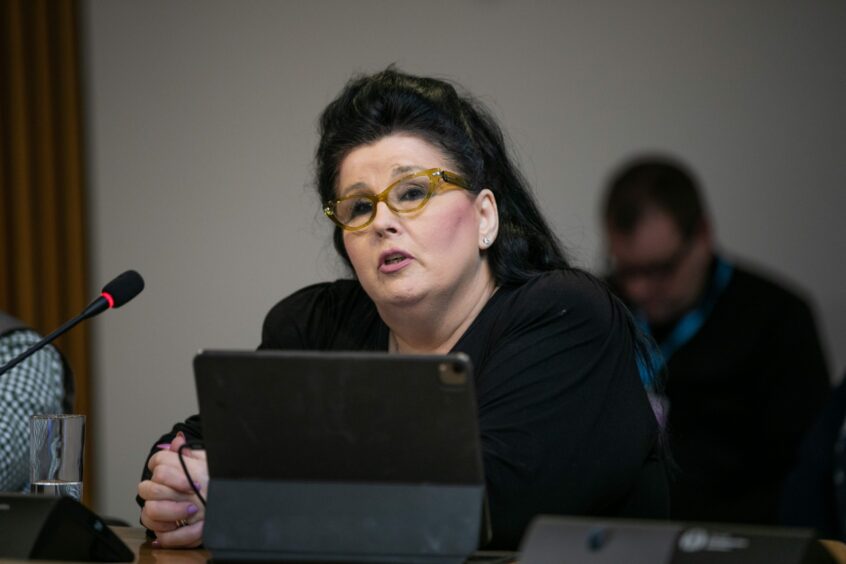 © Andrew Cawley
© Andrew Cawley